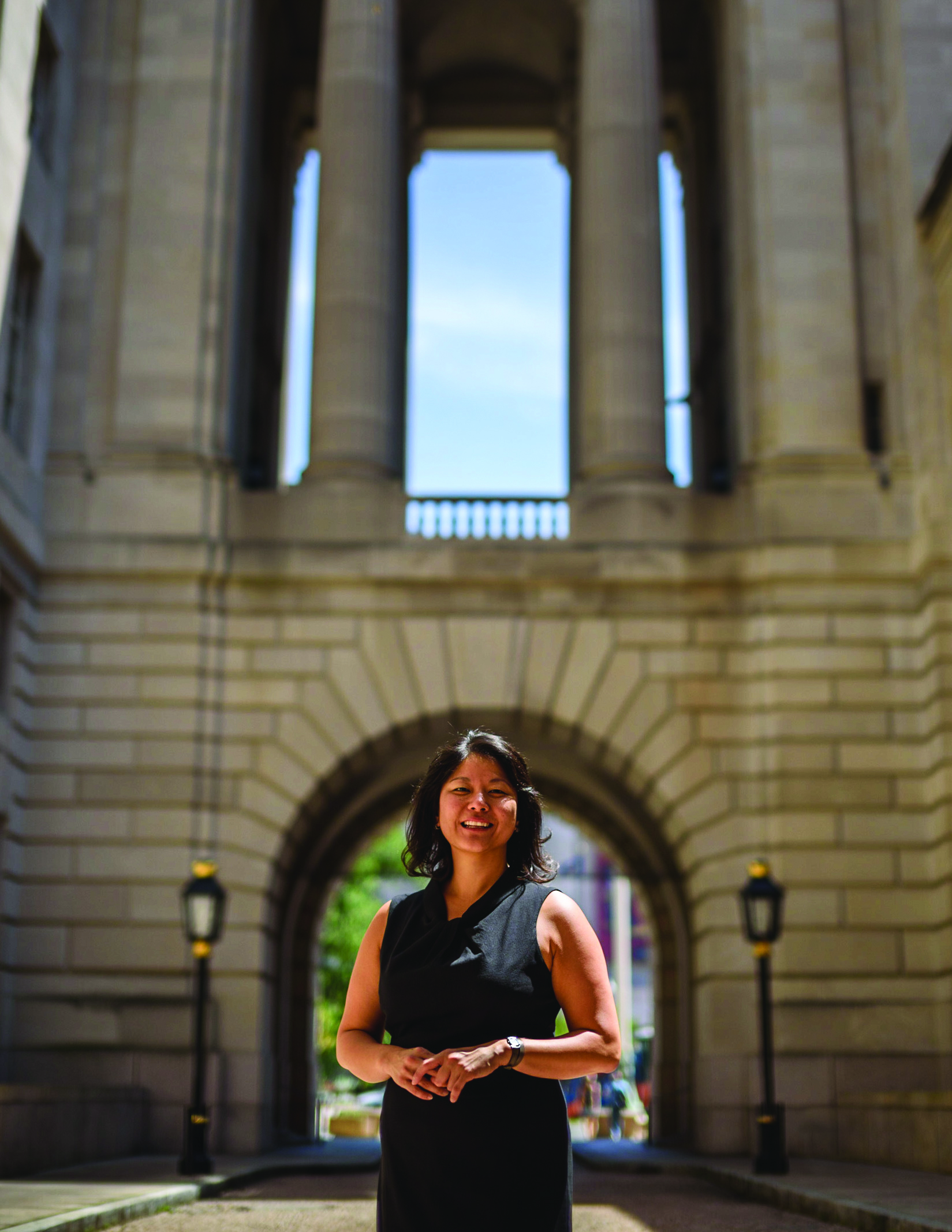 Jini Koh (‘04 ) knows stories about products that find their way to American shores.
Jini Koh (‘04 ) knows stories about products that find their way to American shores.
As counsel in the International Trade Group in Crowell & Moring’s New York office, she has worked around the world — from an apparel floor in Sri Lanka, to a distribution hub in Germany, to agricultural production in Russia, to a solar energy plant in Shanghai.
Sometimes the label that displays the country of origin doesn’t tell the entire story of an item.
“You’re growing cotton in Uzbekistan, which is made into fabric in China, which is then cut and sewn into a garment in Vietnam, which then ends up here,” she said.
Koh’s practice focuses on advising clients on import regulatory compliance, trade remedies and international trade litigation, and she draws from a wide range of experience when addressing trade and customs issues.
Koh emigrated with her family from Korea to the United States when she was 2 years old, and she majored in international relations and environmental studies while an undergraduate at Tulane University. At UA Law, she noticed all of the international trade cases went to the U.S. Court of International Trade, and she later clerked for Judge Nicholas Tsoucalas of the U.S. Court of International Trade for two years. From there, she went to PricewaterhouseCoopers LLP, where she consulted and advised on customs and duty issues.
She understands the intense competition for manufacturing goods overseas and what factors are considered when imported items are priced. Any country that exports apparel to the United States, for example, pays a customs duty, which is a primary revenue raiser for the federal government. The duty is high, she said, because cotton is heavily protected in the United States. Another factor is that the cost of producing items in the U.S. is much higher than it is elsewhere, which is one reason why the cost of labor is such an important factor in trade.
“We worry about outsourcing, but so does China,” she said. “China has to compete with Bangladesh, where the labor rate is one-third of what it is in China.”
It’s a complex regulatory area that requires a deft hand. Koh handles day-to-day compliance work and emergency situations, where a client may be undergoing an audit or answering questions about fraud and litigation.
“Given the complexity and the combination of those very different categories of work, you have to be super quick and nimble on your feet,” said Alexander H. Schaefer, a partner at Crowell & Moring. “That’s Jini’s strength. She can parachute into any of these situations and help manage it efficiently and productively.”
Koh is also a resource for her colleagues.
“She does not hesitate to say: ‘I don’t know that. I will call someone and get back to you,’” said Monica M. Welt, who was in the Torts/Advertising and Product Risk Management group at Crowell & Moring and is now Director of Compliance at Big Lots.
Koh has known she wanted to be a lawyer since she was in middle school in Huntsville, Alabama. The education she proudly received at UA Law enables her to navigate complex trade agreements with ease. The curriculum focused on the application of the law and the analytics of law, teaching her strong fundamentals that she applies daily to the unique problems that her clients face. It is also where she learned how to think like a lawyer.
“What are the boundaries? What does it mean? What is the obligation? What is both compliant and operationally efficient for a company to execute? That’s the kind of thinking that matters every day,” she said.
One thing that matters to Koh is helping those who have served in the military overseas. Crowell & Moring has a deep commitment to pro bono work, and the firm encourages lawyers to step outside of their usual practice areas when searching for pro bono projects. In 2012, Koh, who has two brothers who have served in the U.S. Army, helped U.S. Navy and Marine Corps veterans sue the federal government for illegally cutting their disability benefits.
“I’m not a soldier. That wasn’t my calling, but I can do what I do in a way that it helps someone else.”
The veterans had been discharged for combat-related injuries they sustained during their tours of duty in Iraq during Operation Iraqi Freedom, but the U.S. Department of Veterans Affairs continued to deduct their disability separation pay from their disability benefits contrary to a 2008 change in the law.
The case helped bring the U.S. Navy’s and Marine Corps.’ delay in compliance with the National Defense Authorization Act of 2008, which allows veterans wounded in combat to receive both disability severance pay and VA disability compensation, to the attention of the U.S. Department of Defense and the VA.
Judge Margaret M. Sweeney ruled in 2015 that the Court of Federal Claims lacked jurisdiction to hear the class action complaint because Congress required veterans to seek administrative relief through the VA process instead. After the case was dismissed, the DOD and the VA identified 210 veterans who received a total of $1.5 million.
“There was no intent to do wrong by anyone. The U.S. government is just a big entity,” Koh said. “We brought the lawsuit to force the Navy to go back and find the class, find all of the effected soldiers and on a comprehensive level fix their cases rather than have the veterans find them.”
The University of Alabama School of Law strives to remain neutral on issues of public policy. The Law School’s communications team may facilitate interviews or share opinions expressed by faculty, staff, students, or other individuals regarding policy matters. However, those opinions do not necessarily reflect the views of the Law School, the University, or affiliated leadership.